Resources
Books, Films and Podcasts
 On this page we share a range of resources that may be of interest for you in connection with end-of-life choices. Whether factual to fictional, we hope among them you will find something that resonates for you.
On this page we share a range of resources that may be of interest for you in connection with end-of-life choices. Whether factual to fictional, we hope among them you will find something that resonates for you.
We have included a few links for the books. For films, check your library for a DVD copy or search your streaming services.
Other Resources
- Our Newsletters
- Interviews
- Information for Consumers and Caregivers
- Books, Films and Podcasts
- Witnessess and Contact people
- Voluntary Refusal of Food and Fluid (VRFF)
- Victoria – from leader to laggard in Voluntary Assisted Dying
- Submissions to Inquiries
- Arguments Supporting VAD
- Supporting Organisations
- WFRtDS Conference – Toronto 2022
- WFRtDS Conference – Dublin 2024
Read
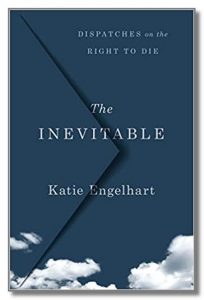 A remarkably nuanced, empathetic, and well-crafted work of journalism, [The Inevitable] explores what might be called the right-to-die underground, a world of people who wonder why a medical system that can do so much to try to extend their lives can do so little to help them end those lives in a peaceful and painless way.”–Brooke Jarvis, The New Yorker
A remarkably nuanced, empathetic, and well-crafted work of journalism, [The Inevitable] explores what might be called the right-to-die underground, a world of people who wonder why a medical system that can do so much to try to extend their lives can do so little to help them end those lives in a peaceful and painless way.”–Brooke Jarvis, The New Yorker
More states and countries are passing right-to-die laws that allow the sick and suffering to end their lives at pre-planned moments, with the help of physicians. But even where these laws exist, they leave many people behind. The Inevitable moves beyond margins of the law to the people who are meticulously planning their final hours–far from medical offices, legislative chambers, hospital ethics committees, and polite conversation. It also shines a light on the people who help them: loved ones and, sometimes, clandestine groups on the Internet that together form the “euthanasia underground.”
Katie Engelhart, a veteran journalist, focuses on six people representing different aspects of the right to die debate. Two are doctors: a California physician who runs a boutique assisted death clinic and has written more lethal prescriptions than anyone else in the U.S.; an Australian named Philip Nitschke who lost his medical license for teaching people how to end their lives painlessly and peacefully at “DIY Death” workshops. The other four chapters belong to people who said they wanted to die because they were suffering unbearably–of old age, chronic illness, dementia, and mental anguish–and saw suicide as their only option.
Spanning North America, Europe, and Australia, The Inevitable offers a deeply reported and fearless look at a morally tangled subject. It introduces readers to ordinary people who are fighting to find dignity and authenticity in the final hours of their lives.
Available from most bookstores, including:
- Amazon AU
- Book Depository
- Booktopia
- Kobo (ebook or audiobook)
- Readings
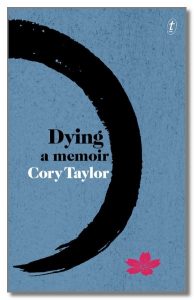 Cory Taylor wrote this remarkable book in the space of a few weeks before her death from melanoma-related cancer in July 2016. In a tremendous creative surge, as her body weakened, she described the experience of knowing she would soon die.
Cory Taylor wrote this remarkable book in the space of a few weeks before her death from melanoma-related cancer in July 2016. In a tremendous creative surge, as her body weakened, she described the experience of knowing she would soon die.Her powerful and beautifully written book is a clear-eyed account of the tangle of her feelings, her reflections on her life, her memories of the lives and deaths of her parents. She tells us why it was important to her to have the ability to choose the circumstances of her death.
Dying: A Memoir is a breathtaking book about vulnerability and strength, courage and humility, anger and acceptance. It is a deeply affecting meditation on dying, but it is also a funny and wise tribute to life.
Cory Taylor was born in Queensland in 1955. She was an award-winning novelist and screenwriter who also published short fiction and children’s books. Her first novel, Me and Mr Booker, won the Commonwealth Writers’ Prize (Pacific Region) in 2012 and her second novel, My Beautiful Enemy, was shortlisted for the Miles Franklin Award in 2014. She died on 5 July 2016, a couple of months after Dying: A Memoir was published.
Available from most bookstores, including:
- Book Depository
- Readings
- Amazon AU
- Kobo (ebook only)
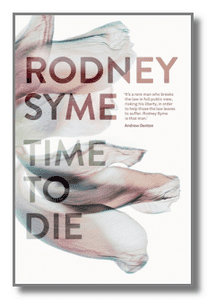 Time to Die is essential reading for anyone following the Voluntary Assisted Dying (VAD) debate in Australia. It brings readers up-to-date with the state of the VAD debate in Australia, with particular focus on the Victorian Parliamentary Inquiry into End-oflifeChoices and the subsequent draft bill to legislate assisted dying.
Time to Die is essential reading for anyone following the Voluntary Assisted Dying (VAD) debate in Australia. It brings readers up-to-date with the state of the VAD debate in Australia, with particular focus on the Victorian Parliamentary Inquiry into End-oflifeChoices and the subsequent draft bill to legislate assisted dying.
As in his previous book, A Good Death (2008), Dr Syme draws on his many years counselling dying patients. In some cases, as he has stated on national television, he personally enabled people to die at the time and place of their own choosing.
Time to Die explores the notion of dignity in some detail,and discusses what we mean by ‘existential suffering’. Dr Syme makes a persuasive case that any legislative framework for assisted dying in Australia should cover not only the terminally ill, but also those who are suffering from what he calls ‘advanced incurable illnesses’, such as Motor Neuron Disease. He argues for this in a compelling chapter, which analyses the notion of suffering, with reference to religiously-inspired ideals.
Time to Die by Dr Rodney Syme can be purchased directly from leading online bookstores.
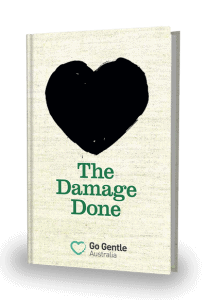
As she was dying of cancer in 2015, 90-year-old Eileen Dawe kept a diary. Despite her clearly stated wish to die she was forced to endure 17 painful weeks until the disease finally took her. Hoping to hasten nature’s course, she began to starve herself to death.
In her diary she wrote, ‘My country’s laws decree “Death by a thousand cuts for me”.’
Eileen’s is one of 72 testimonies in this book that describe with horrifying clarity the damage being done across Australia in the absence of a law for voluntary assisted dying. Written by sons, daughters, husbands, wives, partners, and friends, as well as the dying themselves, they detail trauma and suffering on a staggering scale.
The Damage Done is available in paperback in all Readings book stores in Victoria (click here for locations) for only $19.99.
Alternatively, you can order a copy from Go Gentle Australia’s web shop for $20 plus postage or you can download the Kindle/eBook reader version for $15. All proceeds from their web shop will be used to help fund their organisation.
The PDF is available for free from the web shop.
To visit the Go Gentle Australia web shop, click here.
Please note: The contents of The Damage Done are explicit and emotionally powerful. They may be challenging and disturbing, particularly to readers dealing with grief after the death of a loved one. We advise those readers to consider whether they should seek support or even delay reading the testimonies contained in this book. If this upsets you, please call Lifeline on 13 11 14 or seek additional support.
 Rodney Syme’s candid and controversial account of the terminally ill people who he has assisted to end their lives.
Rodney Syme’s candid and controversial account of the terminally ill people who he has assisted to end their lives.
A Good Death is a candid and provocative account of the experiences of many terminally ill people Dr Rodney Syme has assisted to end their lives. Over the past thirty years Syme has challenged the law on voluntary euthanasia—at first clandestinely and now publicly—risking prosecution in doing so. He again risks prosecution for writing this book.
A Good Death is a moving journey with those who came to Syme for help, and a meditation on what it means in our culture to confront death. It is also a doctor’s personal story about the moral dilemmas and ethical choices he faces working within the grey areas of the law.
In this important book, Rodney Syme argues for the end of the unofficial ‘conspiracy’ of silence within the medical profession and the decriminalisation of voluntary euthanasia in Australia. Through Syme’s determination to tell the stories of those who he has assisted to die with dignity, A Good Death also draws wider lessons of value for those who find themselves in a similar situation.
Available from most bookstores, including:
- Melbourne University Publishing
- Book Depository (free shipping worldwide)
- Amazon (AU)
- Kobo (ebook)
 Australia’s bravest and most honest writer explores the devastating aftermath of her elderly mother’s decision to end her own life.
Australia’s bravest and most honest writer explores the devastating aftermath of her elderly mother’s decision to end her own life.
Nikki Gemmell’s world changed forever in October 2015 when the body of her elderly mother was found and it became clear she had decided to end her own life. After the immediate shock and devastation came the guilt and the horror, for Nikki, her family, relatives and friends. No note was left, so the questions that Elayn’s death raised were endless. Was the decision an act of independence or the very opposite? Was it a desperate act driven by hopelessness and anger, or was her euthanasia a reasoned act of empowerment?
After is the story of Elayn Gemmell – and the often difficult, prickly relationship between mothers and daughters, and how that changes over time. As anguished as it truthful, as powerful as it is profound, After is about life, death, elderly parents, mothers and daughters, hurt and healing, and about how little, sometimes, we know the ones we love the most.
A deeply intimate, fiercely beautiful, blazingly bold and important book.
Available at
A successful young lawyer in Wellington, Lecretia Seales met and fell in love with Matt Vickers in 2003. In Lecretia’s Choice, Matt tells the story of their life together, and how it changed when his proud, fiercely independent wife was diagnosed with a brain tumour and forced to confront her own mortality.

The death she faced—slow, painful, dependent—was completely at odds with how she had lived her life. Lecretia wanted to die with dignity, to be able to say goodbye well, and not to suffer unnecessarily—but the law denied her that choice. With her characteristic spirit, she decided to mount a challenge in New Zealand’s High Court, but as the battle raged, Lecretia’s strength faded. She died on 5 June 2015, at the age of forty-two, the day after her family learned that the court had ruled against her.Lecretia’s Choice is not only a moving love story but compulsory reading for everyone who cares about the dignity we afford terminally ill people who want to die on their own terms.
Available at
 A Beautiful Sunset is a fascinating novel that tells the story of four people facing death, two of them by Voluntary Assisted Dying. Three practice Christianity, the fourth is an atheist, and together, they share a Muslim woman as their doctor.
A Beautiful Sunset is a fascinating novel that tells the story of four people facing death, two of them by Voluntary Assisted Dying. Three practice Christianity, the fourth is an atheist, and together, they share a Muslim woman as their doctor.
Everald Compton has advocated for Voluntary Assisted Dying for 50 years. Now, In A Beautiful Sunset, he has turned his expertise toward crafting complex and humane stories that explore coming to terms with the end of life.
Read this book and you will gain a clearer understanding of Voluntary Assisted Dying. It may also inspire you to happily plan your own ideal final curtain call. Everald is 89 years old and proudly Australian. If circumstances dictate it, he is ready to end his life by VAD.
- Available at-
- Angus & Robertson
- Amazon
- Dymocks
A transformative and compassionate memoir by a leading pioneer in medically assisted dying who began her career in the maternity ward and now helps patients who are suffering explore and then fulfill their end of life choices.
 Dr. Stefanie Green has been forging new paths in the field of medical assistance in dying since 2016. In her landmark memoir, Dr. Green reveals the reasons a patient might seek an assisted death, how the process works, what the event itself can look like, the reactions of those involved, and what it feels like to oversee proceedings and administer medications that hasten death. She describes the extraordinary people she meets and the unusual circumstances she encounters as she navigates the intricacy, intensity, and utter humanity of these powerful interactions.
Dr. Stefanie Green has been forging new paths in the field of medical assistance in dying since 2016. In her landmark memoir, Dr. Green reveals the reasons a patient might seek an assisted death, how the process works, what the event itself can look like, the reactions of those involved, and what it feels like to oversee proceedings and administer medications that hasten death. She describes the extraordinary people she meets and the unusual circumstances she encounters as she navigates the intricacy, intensity, and utter humanity of these powerful interactions.
Deeply authentic and powerfully emotional, This Is Assisted Dying contextualizes the myriad personal, professional, and practical issues surrounding assisted dying by bringing readers into the room with Dr. Green, sharing the voices of her patients, her colleagues, and her own narrative. As our population confronts issues of wellness, integrity, agency and community, and how to live a connected, meaningful life, this progressive and compassionate book by a physician at the forefront of medically assisted dying offers comfort and potential relief.
This Is Assisted Dying will change the way people think about their choices at the end of life, and show that assisted dying is less about death than about how we wish to live.
- Available March 29, 2022 at
- Amazon
- Booktopia
- Simon and Schuster
Watch
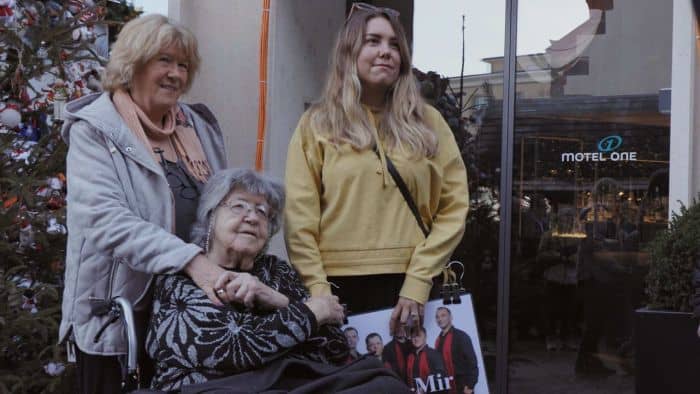 Laura Henkel is eccentric, outspoken, feisty and 90 years old. She has decided she wants to end her life on her own terms, and she asks her daughter Cathy and granddaughter Sam, both filmmakers, to make a film about it.Laura Henkel is eccentric, outspoken, feisty and 90 years old. She has decided she wants to end her life on her own terms, and she asks her daughter Cathy and granddaughter Sam, both filmmakers, to make a film about it.Laura Henkel is eccentric, outspoken, feisty and 90 years old. She has decided she wants to end her life on her own terms, and she asks her daughter Cathy and granddaughter Sam, both filmmakers, to make a film about it.
Laura Henkel is eccentric, outspoken, feisty and 90 years old. She has decided she wants to end her life on her own terms, and she asks her daughter Cathy and granddaughter Sam, both filmmakers, to make a film about it.Laura Henkel is eccentric, outspoken, feisty and 90 years old. She has decided she wants to end her life on her own terms, and she asks her daughter Cathy and granddaughter Sam, both filmmakers, to make a film about it.Laura Henkel is eccentric, outspoken, feisty and 90 years old. She has decided she wants to end her life on her own terms, and she asks her daughter Cathy and granddaughter Sam, both filmmakers, to make a film about it.
Find out more on Laura’s Choice website
Watch Laura’s Choice in 2 x 1 hour episodes on ABC iView
 Life, death and the law – A documentary about assisted dying in Australia
Life, death and the law – A documentary about assisted dying in Australia
Peter Short, the charismatic CEO of a major Australian company, learns that he has only months to live after he is diagnosed with terminal oesophageal cancer. Not wanting to face a painful death, Peter decides to source the lethal drug Nembutal, giving him the option to end his own life peacefully. With the help of a rogue doctor who supplies the drug to suffering patients, Peter sets out to have voluntary euthanasia legalised in Australia.
In addition to Peter’s journey, Fade to Black also provides a history and background to the issue of assisted dying, including the passing and subsequent reversal of VAD in the Northern Territory, as well as the legislation that exists in other countries. The movie features interviews with key players in the Australian debate, including Dr Rodney Syme, Andrew Denton and Dr Philip Nitschke, as well as politicians for change, Dr Richard Di Natale and Fiona Patten.
For more information about the film and viewing/purchasing options, visit the Fade to Black website.
 Rex is a cab driver who has never left the mining town of Broken Hill in his life. When he discovers he doesn’t have long to live, he decides to drive through the heart of the country to Darwin, where he’s heard he will be able to die on his own terms.
Rex is a cab driver who has never left the mining town of Broken Hill in his life. When he discovers he doesn’t have long to live, he decides to drive through the heart of the country to Darwin, where he’s heard he will be able to die on his own terms.
Michael Caton stars as the terminally ill cab driver whose shocking diagnosis makes him seize the day – and the car keys. He sets off on an epic road trip from Broken Hill to Darwin, to take charge of his own destiny.
The movie is partly based on the story of Max Bell, a terminally ill cab driver who made the same drive as depicted in the film in the early nineties, hoping to take advantage of the Northern Territory’s voluntary euthanasia laws.
This is a film about a film. Fatal Fraud is a case study about techniques used by opponents against evidence-based public policy initiatives. In this film, Andrew Denton explains with the help of leading experts how emotional manipulation, fear, framing and omission are deployed to sow Fear, Uncertainty and Doubt in the minds of legislators and the public. https://www.gogentleaustralia.org.au/fatal_fraud
Listen
Better Off Dead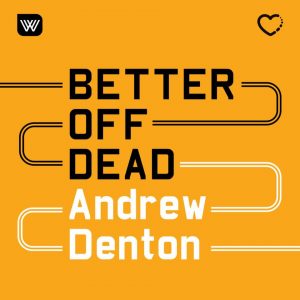 is a series of podcasts from Andrew Denton and the Wheeler Centre.
is a series of podcasts from Andrew Denton and the Wheeler Centre.
There were two seasons recorded, with a hiatus of 5 years between them.
You can listen to to all the podcasts on the Wheeler Centre website.
SEASON 1 (6 November 2015 – 13 April 2016)
Andrew Denton investigates the stories, moral arguments and individuals woven into discussions about why good people are dying bad deaths in Australia.
SEASON 2 (1 March 2021 – 27 May 2021)
Andrew Denton investigates the stories behind Victoria’s landmark Voluntary Assisted Dying (VAD) law: Who seeks to use it, and why? Who are the doctors stepping forward to help them? And how does the church continue to resist a law it describes as ‘evil’? Co-produced by Go Gentle Australia and the Wheeler Centre, season two of Better Off Dead looks at what happened in Victoria after the legislation came into effect in June 2019.
Accordion Content
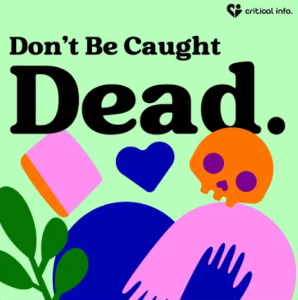
Don’t Be Caught Dead is a podcast that promotes candid discussions surrounding mortality and the loss of loved ones.
Catherine Ashton, the podcast’s host and founder of Critical Info, aims to revive your narratives of death through meaningful storytelling.
“Because while you may not be ready to die, at least you can be prepared.”
You can find the podcast on ‘Apple Podcasts’ and ‘Spotify’.
 Through this podcast, hosted by hosted by a South Australian GP, Dr Laureen Lawlor-Smith, families, friends and healthcare professionals share their VAD journeys to support others in understanding and exploring this end-of-life choice.
Through this podcast, hosted by hosted by a South Australian GP, Dr Laureen Lawlor-Smith, families, friends and healthcare professionals share their VAD journeys to support others in understanding and exploring this end-of-life choice.
The journeys undertaken in this podcast are deeply personal and reflective of the speakers’ own experiences and circumstances. The content of this podcast does not replace specialised advice from trained VAD healthcare professionals
Don’t miss Episode 5 – Supporting families through the journey of VAD, in which Jane Nosworthy (DWDV Secretary) and Kerrie Arthur (Griefline) discuss the importance of death literacy, addressing stigma, and providing support for families during and after the process. Programs like grief support groups and drop-in sessions aim to offer ongoing emotional support to caregivers.
